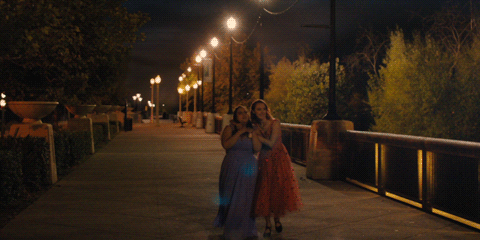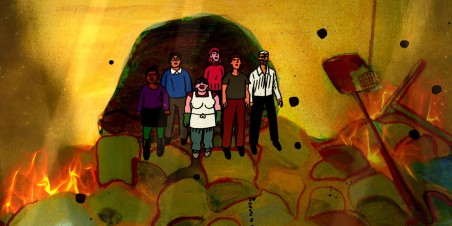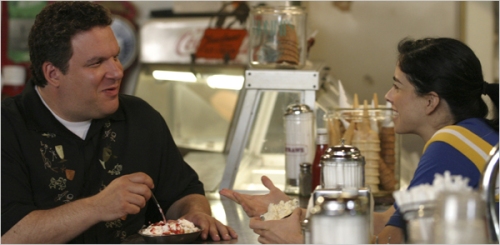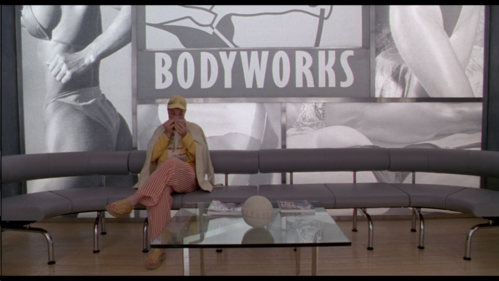I’d had Heavy in mind for the Trope Deep Dive from the start, and praises be to the movie gods, it went from “it’s a nice thought but I don’t know how I’ll get my hand on it” to “holy shit it’s on Netflix” over the course of working on this series. Heavy was one of the first indie films I watched as a young person, partially due to my nascent interest in this subject and partially because it was largely filmed in the region where I grew up. The film could be described as restrained; like its protagonist, Vincent (Pruitt Taylor Vince), it’s very sparse and selective in what it has to say, focusing on a brief point in Vincent’s life where a beautiful young woman, Callie (Liv Tyler) takes a waitressing job at the restaurant he owns with his mother, Dolly (Shelly Winters). Because it is such a simple story, it can be looked at in terms of the other films I’ve discussed over the past several months, as a means of highlighting shared qualities of the other twelve films I’ve discussed so far featuring romances between fat men and thin women.
Vincent is a middle-aged, single (presumably never-married) man living and sharing a family business with his mother that she had owned with his now-deceased father. Vincent’s size is a source of insecurity which she glosses over. In one particularly memorable scene, he skips breakfast and when she asks why, he gives “I’m fat” as the reason. Her automatic response is to render his statement and the feelings behind it as invalid: “You are not fat, you are not. Honey, you’re husky. You’re well built. You’re macho.” “I am FAT, Ma,” he responds more forcefully, the only point in the film at which he confronts her. Not uncommon to fat protagonists, Vincent’s size has to Mean Something, and we discover that his fatness is symptomatic of his arrested development. Although he is characterized as a good cook, when he is at work we only see him making pizza, a food commonly associated with fatness. When Callie suggests that he has the talent to be a chef if he studied at the Culinary Institute of America, Dolly and Delores (Debbie Harry), a waitress who has been working at Pete and Dolly’s for over a decade, shut down the idea before Vincent can get a word in: “They would just charge a lot of money to teach him what he already knows.” Of course there are fat gourmet chefs, so it’s not the neatest of dichotomies, but Vincent’s body and the food he makes are fatty and pedestrian, in comparison to the finer alternative offered by Callie. Dolly also reveals that her desire to keep Victor at home making pizzas is an expression of her inability to accept her husband’s death: “when you began to… grow… it was almost like I had him back again.” Victor is in a role that keeps his family’s life in stasis as much as possible: looking like his father, taking care of his mother, and working his father’s job in the restaurant that still bears his father’s name. When Dolly dies, he shows a similar unwillingness to move on, and only tells Callie that she died once she’s in the ground. Perhaps it’s worth noting that Dolly is one of the few fat women in the films I’ve included in the trope deep dive; the only other one I can recall off the top of my head is also a mom–Kathy Bates in Angus.

Vincent (Pruitt Taylor Vince), in domestic setting.
Stagnancy or need for maturation, especially when it means reliance on family in a manner deemed socially inappropriate to an eligible bachelor, is a common starting point for fat men who are romantic leads. James in I Want Someone to Eat Cheese With, Danny in Only the Lonely, and Jack in Jack Goes Boating are all grown men living with family members. Angus, Terri, and the Motel are about minors who naturally live with family, but are all in caretaking roles (Angus and Terri of sick relatives, Ernest of his family’s business) that afford them less autonomy than their peers. Dex in The Tao of Steve and Ben in Knocked Up don’t live with family of origin, but rather with a tight-knit group of friends who enable each others’ adolescent habits. Living with (and caring for) family suggests a body equipped for domesticity and comfort, the attributes that would be preferable for a long-haul relationship. Living with similarly slackerish friends suggests an adolescent indolence that requires fixing through maturity (ie. in the direction of a productive job and nuclear family).
This domesticity and/or arrested development also usually comes with another layer of outsiderness or contempt, often based on the character’s fatness. In Heavy, Vincent is held back over and over again by language based on his weight. When he tries to assert himself as restaurant manager to Dolores, he is confronted by regular Leo (Joe Grifasi) on her behalf: “Just because your mommy’s sick doesn’t mean you can shit on people, you fat fuck.” Even though Vincent makes a reasonable demand (that Dolores be more civil to Callie, her coworker), his size and closeness to his mother are easily invoked to discredit him. Even when he and Callie are able to share some alone time together, she describes him as “more to love,” trying to be congenial but ending up patronizing, especially considering that Vincent desperately wants her to return his feelings.
Status as a social outsider is common to the other fat male love interests. All four of the school-age protagonists I’ve covered (in Superbad, the Motel, Angus, and Terri) are bullied. The male love interests in Hitch, Knocked Up, Enough Said, and I Want Someone… are all coded as unattractive, at least in part due to their size. I Want Someone… even focuses on how James’ weight impacts his work as an actor, when he can’t even get an audition for the remake of Marty because former teen pop idol Aaron Carter was cast as the lead. Dex in The Tao of Steve is shown as being able to get laid despite being fat, and being unable to commit to a relationship in part due to his insecurity over his weight. The female love interests, on the other hand, are thin and conventionally beautiful. Additionally, in several cases, they have more social capital (or literal capital). In Hitch, The Tao of Steve and Knocked Up, they have more money and/or more prestigious jobs than their male counterparts; in Superbad and Angus, they are more popular at school.
Even if Callie is a waitress, ultimately she is an outsider to the world of the restaurant where Vincent feels stuck. She is taking time off from college and aspires to be a photographer, which neither Dolores nor Dolly validate. “Not everybody’s gotta go to college. Somebody’s gotta roll up their sleeves and do the work,” Dolly tells her during her interview. There is a complimentary disdain between Callie and Dolly, even if Callie tries to put a friendly face on it. Pete and Dolly’s is a temporary resting place for her while she figures things out, whereas it’s Dolly’s whole life. Suggesting that Victor would want to go to school and work in a fancier establishment is an insult to Dolly, even if taking his feelings into consideration would be a more loving response than speaking on his behalf. Callie’s separation from their world is embodied by her boyfriend Jeff (Evan Dando), a musician who refuses to step foot in the restaurant. “I guess he thinks they’re all trash or something,” Callie tells her friends. Victor finds an ambivalent place between the two, feeling separated from Callie but also wanting to expand his horizons. After his mother dies, he takes a tour of the Culinary Institute of America. His desire to free himself from stagnancy also comes in the form of trying to lose weight, a goal he starts pursuing when he sees Callie making out with Jeff. The film’s hopeful ending includes a meetcute with the cashier at the grocery where he buys weight-loss shakes.

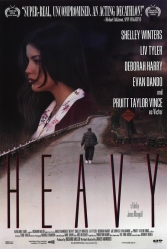
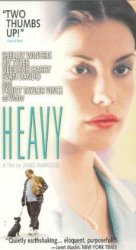
I love how the posters have Liv Tyler’s image largest, suggesting that maybe she plays the protagonist, experiences some personal growth, reveals her inner world…? No, but she is the most normatively attractive of the main characters.
It’s not uncommon for movies with romantic narratives to include parallel self-improvement arcs for one or both of the characters falling in love. However, Vincent’s weight-loss subplot in Heavy is an example of a pattern I’ve noticed across most of the films in the trope deep dive series: a fat man improving himself to become worthy of a thin woman’s love. Heavy is similar to Superbad and Hitch, where a fat character changes himself and goes outside his comfort level to attract the attention of a thin love interest. Knocked Up, Jack Goes Boating, The Tao of Steve, and Only the Lonely all feature fat men who are able to start a relationship with a thin woman, but need to change something about themselves to prove their commitment to her. Of the remaining films: Terri and The Motel end with the male protagonists being rejected by the objects of their affections; the protagonists of I Want Someone… and Angus change for their own benefit and end up impressing their love interests as a result; and The Lobster and Enough Said engage with the aforementioned trope of men improving themselves to gain the love of women by actively criticizing it. Although Victor’s focus is on his weight (and he isn’t actually successful in changing it over the course of the movie), other films feature more significantly life-changing choices in the interest of pursuing romance, including overall life improvement (Knocked Up, Jack Goes Boating), significantly changing a relationship dynamic with a parent (Only the Lonely), and dramatically quitting a job (Hitch). This suggests that the romantic satisfaction in these films, for the female audience, is the idea of being a muse of sorts: her affection and approval are such valuable goals for him to achieve, she inspires him to become “better.” The last lines of Jack Goes Boating illustrate this idea explicitly: “I knew you’d be good.” “I am, for you.” The “for you” aspect of the sentiment connects neatly with the ideal of lifelong monogamy, where an individual person is unfulfilled without the one partner who sees them as beautiful and can unlock their hidden potential.
Being able to love a fat outsider also speaks to a certain virtuous quality in the thin women characters. It suggests a lack of elitism and an emotional integrity, the ability to see “real” beauty and find love without caving to social expectations. When Callie and Vincent are alone, she tells him that he’s “cooler than someone would think.” She’s also an aspiring photographer and finds him to be an interesting subject, bringing a lacking artistic sensibility to his world. However, this willingness to look beyond convention doesn’t extend to the female characters themselves, who are all portrayed by actors who are popularly considered beautiful and/or coded within their film as desirable to other male characters besides their fat admirers. Highlighting both the female characters’ desirability and the male characters’ capacity to care for her, often she is initially attracted to or in a relationship with a thin man who is not as good a fit for her as the fat romantic lead would be (The Tao of Steve, Hitch), doesn’t understand her the way that the fat romantic lead does (The Motel), or is an outright douchebag to her (Angus, Heavy).
Perhaps it’s an oversimplification to assume that audience members would identify with characters involved in a romantic plot based on a shared gender. Personally, I’ve frequently felt a certain alienation from these kinds of female characters in films, which I could attribute to being both fat and nonbinary, while also not fully identifying with the fat male characters who are in love with them. But to a certain extent, we watch films for the vicarious pleasure of seeing how characters react to specific circumstances; consider the post-modern horror convention of smugly outlining a survival plan for a slasher attack or zombie apocalypse. And this group of films give us an expansion of what a romantic male lead would look like, while the image of a romantic female lead is very much in its lane. (Apparently to have the sensibilities to look beyond beauty conventions, one actually has to be a female romantic lead in one of these movies.) The divide in audience identification with these respective characters seems to be “Would I be able to attract someone like her?” versus “Would I be able to look past initial judgments and see that he loves me?” Or, to put it in terms of how most of the plots play out, “I’ve won the love of a beautiful woman” versus “I’ve realized that I’m loved by a devoted man.” The way this dynamic plays out in Heavy— at least, in Vincent’s imagination– highlights its problematic nature. Vincent has a recurring daydream in which he finds Callie floating in the river, takes her home and cares for her– in every scene of the sequence, she is wet and her skin is bluish, as if she were dead. Vincent is characterized by his timidity and seeming lack of live experience, so his dream is innocent, in a sense: his affection is expressed by caregiving, never sexual activity. However, it is disturbing that the way he imagines a relationship with Callie is having her lifeless and dependent on him. But Callie has a life of her own, and the film ends with them moving in their own separate directions.
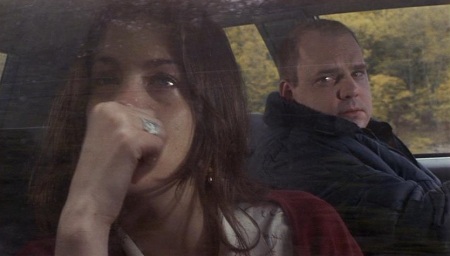
Callie (Liv Tyler) and Vincent
As opposed to the kind of romantic film that end with a woman swept off her feet by a man who is wealthier (Pride and Prejudice, Pretty Woman) or lives more deeply than she (Dirty Dancing, All That Heaven Allows), the films I’ve looked at over the past several months largely find their romantic ideal in a man who is willing to make a change for the sake of a relationship. This kind of arc isn’t exclusive to romantic stories pairing fat men with thin women (Shaun of the Dead, High Fidelity), but looking back at this series, I’m struck by the frequency with which it popped up. Even if these films present a different idea of what a male romantic lead looks like– and considering that 9 out of the 13 are indies, one would expect at least some deviation from mainstream film standards– they are still mired in sexist, heteronormative ideas of how to a romance is formulated. To be explicit: men act and women react; men strike forth to earn what they desire, women wait passively (or unknowingly) for their emotions to be stirred. This dynamic also does a disservice to its presumably subversive male lead. The journey of self-improvement, even if it doesn’t include weight loss, implies that he has to prove his worthiness. It functions as a compensation, gives her a reason to fall in love with him. Even in Angus and I Want Someone…, where the male protagonists respectively make decisions to face a fear and move out of mom’s house for their own good, their love interests start to return their feelings as an outcome. The only film that is a true exception to this dynamic is Enough Said, in which Eva tries to get Albert to change his ways, only to have it blow up in her face and realize that having a flawed Albert in her life is better than no Albert at all. It’s probably not a coincidence that Enough Said is the only film of this series with a female protagonist. Even though a fair number of these films don’t explicitly make the male romantic interest’s weight a potential reason that he wouldn’t be seen as a viable partner, the need to “be good” in order to win her love, paired with being fat, is enough to keep these stories at least partly mired in the typical idea that a fat person can’t be “good” enough to be a mate.
